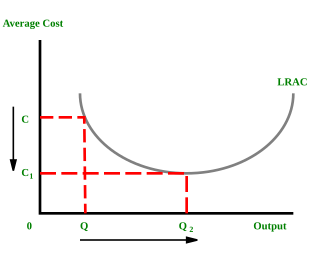
In microeconomics, economies of scale are the cost advantages that enterprises obtain due to their scale of operation, and are typically measured by the amount of output produced per unit of time. A decrease in cost per unit of output enables an increase in scale that is, increased production with lowered cost. At the basis of economies of scale, there may be technical, statistical, organizational or related factors to the degree of market control.
Management is the administration of organizations, whether they are a business, a nonprofit organization, or a government body through business administration, nonprofit management, or the political science sub-field of public administration respectively. It is the process of managing the resources of businesses, governments, and other organizations.

An organization or organisation, is an entity—such as a company, an institution, or an association—comprising one or more people and having a particular purpose.

Industrialisation (UK) or industrialization (US) is the period of social and economic change that transforms a human group from an agrarian society into an industrial society. This involves an extensive reorganisation of an economy for the purpose of manufacturing. Industrialisation is associated with increase of polluting industries heavily dependent on fossil fuels. With the increasing focus on sustainable development and green industrial policy practices, industrialisation increasingly includes technological leapfrogging, with direct investment in more advanced, cleaner technologies.
Economies of scope are "efficiencies formed by variety, not volume". In economics, "economies" is synonymous with cost savings and "scope" is synonymous with broadening production/services through diversified products. Economies of scope is an economic theory stating that average total cost of production decrease as a result of increasing the number of different goods produced. For example, a gas station that sells gasoline can sell soda, milk, baked goods, etc. through their customer service representatives and thus gasoline companies achieve economies of scope. The business historian Alfred Chandler argued that economies of scope contributed to the rise of American business corporations during the 20th century.
In the field of management, strategic management involves the formulation and implementation of the major goals and initiatives taken by an organization's managers on behalf of stakeholders, based on consideration of resources and an assessment of the internal and external environments in which the organization operates. Strategic management provides overall direction to an enterprise and involves specifying the organization's objectives, developing policies and plans to achieve those objectives, and then allocating resources to implement the plans. Academics and practicing managers have developed numerous models and frameworks to assist in strategic decision-making in the context of complex environments and competitive dynamics. Strategic management is not static in nature; the models can include a feedback loop to monitor execution and to inform the next round of planning.
Departmentalization refers to the process of grouping activities into departments. Division of labour creates specialists who need coordination. This coordination is facilitated by grouping specialists together in departments.
Alfred DuPont Chandler Jr. was a professor of business history at Harvard Business School and Johns Hopkins University, who wrote extensively about the scale and the management structures of modern corporations. His works redefined business and economic history of industrialization. He received the Pulitzer Prize for History for his work, The Visible Hand: The Managerial Revolution in American Business (1977). He was a member of both the American Academy of Arts and Sciences and the American Philosophical Society. He has been called "the doyen of American business historians".

John Edgar Thomson was an American civil engineer and industrialist. An entrepreneur best known for his leadership of the Pennsylvania Railroad (PRR) from 1852 until his death in 1874, Thomson made it the largest business enterprise in the world and a world-class model for technological and managerial innovation. Previously the railroad's first chief engineer, he became its third president.
Social peer-to-peer processes are interactions among humans with a peer-to-peer dynamic. Peer-to-peer (P2P) is a term that originated from the popular concept of the P2P distributed computer application architecture which partitions tasks or workloads between peers. This application structure was popularized by file sharing systems like Napster, the first of its kind in the late 1990s.
The economic history of China describes the changes and developments in China's economy from the founding of the People's Republic of China (PRC) in 1949 to the present day. The speed of China's transformation in this period from one of the poorest countries to one of the world's largest economies is unmatched in history.
Economic planning is a resource allocation mechanism based on a computational procedure for solving a constrained maximization problem with an iterative process for obtaining its solution. Planning is a mechanism for the allocation of resources between and within organizations contrasted with the market mechanism. As an allocation mechanism for socialism, economic planning replaces factor markets with a procedure for direct allocations of resources within an interconnected group of socially owned organizations which together comprise the productive apparatus of the economy.
The Pulitzer Prizes for 1978 are:
Managerialism is the reliance on professional managers and organizational strategies to run an organisation. It may be justified in terms of efficiency, or characterized as an ideology. It is a belief system that requires little or no evidence to justify itself. Thomas Diefenbach associates managerialism with a belief in hierarchy. Other scholars have linked managerialism to control, accountability, measurement, strategic planning and a belief in the importance of tightly-managed organizations.
Business history is a historiographical field which examines the history of firms, business methods, government regulation and the effects of business on society. It also includes biographies of individual firms, executives, and entrepreneurs. It is related to economic history. It is distinct from "company history" which refers to official histories, usually funded by the company itself.
Thomas Kincaid McCraw was an American business historian and Isidor Straus Professor of Business History, Emeritus at Harvard Business School, who won the 1985 Pulitzer Prize for History for Prophets of Regulation: Charles Francis Adams, Louis D. Brandeis, James M. Landis, Alfred E. Kahn (1984), which "used biography to explore thorny issues in economics."
Multi-divisional form refers to an organizational structure by which the firm is separated into several semi autonomous units which are guided and controlled by (financial) targets from the center.
The Vanishing Hand theory is a concept first conceived of by economist Richard Normand Langlois. The term is an intentional play on both Adam Smith's invisible hand and Alfred Chandler's Visible Hand.

Chen Jinhua was a Chinese politician. Chen joined the Chinese Communist Party (CCP) in February 1949 and studied at Renmin University of China from 1953 to 1955 and from 1960 to 1962. From the 1950s through the 1970s, he served in positions of increasing responsibility in China's former Ministry of Textile Industry and Ministry of Light Industry. From 1977 to 1983, Chen served on the Standing Committee of the Shanghai Municipal People's Congress, as well as deputy secretary of the Shanghai CCP Committee. From 1983 to 1990, he served as the general manager and CCP committee secretary of state-owned oil company Sinopec.
American business history is a history of business, entrepreneurship, and corporations, together with responses by consumers, critics, and government, in the United States from colonial times to the present. In broader context, it is a major part of the Economic history of the United States, but focuses on specific business enterprises.







